Hitting the road in winter with your RV? Let’s talk insulation. Keeping your RV cozy is key when the temperature drops. Insulation can make or break your trip, so check seals on doors and windows and maybe throw in some thermal curtains for good measure. They’re a lifesaver.
Before heading out, a good ol’ maintenance check is a must. Being stuck with a faulty heater in freezing weather isn’t anyone’s idea of a fun time. Check your motor home or tow vehicle’s antifreeze, battery, tires, and heating system to ensure everything’s in tip-top shape.
Winter doesn’t just change the landscape; it changes what you need to pack. Don’t forget essentials like snow chains for your tires and plenty of windshield de-icer. Oh, and stock that RV with cozy blankets, portable heaters, and a sturdy ice scraper. Because, well, ice happens.
Now, I’m a fan of planning ahead, and for winter trips, that includes stocking up the RV with all the fluffy and warm things. Thick blankets, an extra sleeping bag, and maybe some electric blankets should come along for the ride. These little comforts make those winter nights way more bearable.
Understanding Seasonal Safety Measures
Hitting the road in icy conditions definitely requires a game plan. Keeping an eye on weather forecasts and road conditions should be the first step before every drive. Make sure your weather app is updated and reliable because knowing what you’re headed into is a huge plus.
Driving on snow-covered roads isn’t a walk in the park. Keeping your speed down and maintaining a generous following distance will go a long way in ensuring your safety. Practice makes perfect, so maybe familiarize yourself with handling your RV through some lower-stakes roads first.
Every winter journey has its risks, so having essential safety gear onboard is non-negotiable. A first aid kit, snow shovel, road flares, and extra windshield washer fluid are basics that can make a big difference when the going gets tough.
Making sure you have an emergency roadside assistance plan is like having a safety net you didn’t know you needed. Breakdowns or getting stuck happen, and when they do, you’ll want a quick way to get help. No one wants to be stranded in freezing temps without a backup plan.
Choosing Winter-Friendly RV Campgrounds
Finding an RV campground that stays open during winter is like striking gold for the winter traveler. Many campgrounds close down as the snow falls, so doing your homework beforehand is crucial. Some parks embrace the winter season and keep their doors open for adventurers like you.
Once you’ve found an open campground, check the facilities they offer. You want places that provide hookups for water, sewage, and electricity even in the coldest months. They should also keep roads within the campground clear of snow and ice because nobody likes being stuck.
When it comes to water hookup and freezing concerns, a heated water hose is mandatory if you plan to stay hooked up to water when the temperatures drop below freezing. You may also have to use heat tape to keep the RV park water service from freezing, too.
We fill the fresh water tank, use the RV water pump, and unhook the RV from the park’s water service. That has been our best method to protect the RV’s water system when it’s below freezing.
Booking your spot in advance is more important in winter than in the warmer months. Once you know where you’re headed, make those reservations. Spaces that remain open can fill up quickly as they’re usually in limited supply.
Finally, understand the rules at your chosen winter campground. They may have specific guidelines about fires, electricity usage, or waste disposal specific to the colder months. Always playing by the rules ensures a smooth and hassle-free stay.
Planning an Efficient Itinerary
Mapping your trip from the get-go keeps surprises to a minimum. Knowing your route means you can dodge those unexpected road closures or bad weather spots. Plus, it’s always handy to have a few alternate routes up your sleeve just in case Mother Nature throws a curveball.
Picking destinations with a warmer climate or activities that you can enjoy even when it’s snowy can make your trip much more enjoyable. Look for spots with hot springs, winter festivals, or even indoor attractions if the weather turns nasty.
Time is your friend in winter travel. Plan for extra travel time; icy roads and winter storms have a knack for slowing you down. Being flexible with your timing helps keep stress levels down and enjoyment levels up.
When you know bad weather is on the way, it might be best to stay put. Cutting travel time short or spending an extra day somewhere cozy can keep everyone happy and safe. Avoid the temptation to push through sketchy weather just to stick to a schedule.
Keeping Warm and Comfortable Inside Your RV
Getting that RV nice and toasty during those winter nights is top priority, trust me. Let’s talk heating. You’ve got options, such as electric heaters, which can efficiently keep things warm if you’re connected to grid power. Portable propane heaters are another way to go when you want to conserve electricity, but ventilation is key here.
Dressing in layers inside the RV isn’t just smart; it’s downright necessary when it’s cold out. Think cozy pajamas, warm socks, and that favorite hoodie. It’s like being swaddled in pure comfort while you binge on your favorite shows.
Insulation inside the RV can’t be forgotten. Adding rugs to the floor can help keep the chill away from your toes, and adhesive weather strips can seal up those pesky drafty spots around doors and windows.
Let’s talk about heat loss. Every time you open those doors or windows, say goodbye to some of that precious heat. Keeping them closed as much as possible and covering windows with thermal shades when it’s particularly cold can help keep things snug inside.
Embracing the Joys of Winter Travel
Winter RV travel isn’t just about getting from one place to another; it’s about soaking in all the unique experiences along the way. Winter sports like skiing and snowboarding add a dash of adrenaline and fun to your journey. Many RV-friendly spots are near ski resorts, turning your driveway into the best parking spot pit stop.
Snow-covered landscapes offer breathtaking views and are perfect for photography buffs and casual hikers alike. Whether you’re snapping pics of snow-laden trees or taking a peaceful walk in a winter wonderland, it’s the kind of stuff that creates core memories.
Finding RV communities that travel in the winter opens doors to shared experiences and maybe even some caravan travel. Joining up with fellow enthusiasts is a great way to discover hidden gems and make new friends along the way.
Finally, off-season travel boasts its own unique appeal. Less crowded spots mean more space for your adventures, and you might even snag a deal or two. Plus, there’s something magical about enjoying a quiet campsite with a snowy view. Winter adds a whole new perspective to RV life, one filled with unexpected beauty and loads of adventure.
Our Recent Winter Camping Experience
We typically don’t go looking for cold climates to enjoy our full time RV life. After living in the mountains of Colorado for twenty-five years, we have seen enough snow!
But what happens when winter shows up where it usually does not normally appear?
This happened recently for us. We are staying on the Gulf Coast to avoid cold temperatures. Temperatures in the sixties and forties in January are perfectly acceptable for us.
But, Snowmaggedan occurred, and we had temperatures in the teens and twenties at night, along with eight inches of snow. That was a once-in-a-century event!
So, how did we keep the RV safe from freezing temperatures? We unhooked our water service and used the onboard water system for a week. We also removed our sewer hose to prevent damage to the black and grey gate valves. If needed, we dumped our tanks when the daytime temperatures were above freezing.
Inside, we used our RV furnace and a small space heater to keep cozy and warm. We had a good supply of propane, having to refill our thirty-pound DOT cylinders several times. One thirty-pound tank can create twenty-one hours of furnace heat. We found our furnace ran about thirty minutes each hour: six minutes on, six minutes off.
Our Airstream is well insulated, and water lines and all tanks are heated as long as the furnace is running.
The result? We survived the cold temperatures, as low as twelve degrees F, with no damage to the RV! Some of our neighbors were not so lucky. However, they did not prepare as we did.
We even monitor the temperatures in our storage and plumbing bays by using temperature sensors placed in sensitive locations.
So, be prepared for colder temperatures, and you will have enjoyable cold weather RVing!
_______________________________________________________________
To learn more about us, click here.
Please feel free to ask a question or leave a comment before you read other articles on our website.
Pam and I hope that while you enjoy the RV lifestyle, you also run an online business from your RV! We do!!
With great RV connectivity, as discussed on this website, you can easily make money while traveling to whatever destination you desire.
Would you like to create an income while enjoying RV travel? Is there something that you are passionate about? You can create an online business that you can run anywhere. I can help you do that!
CREATE AN ONLINE BUSINESS FROM SOMETHING YOU LOVE TO DO!

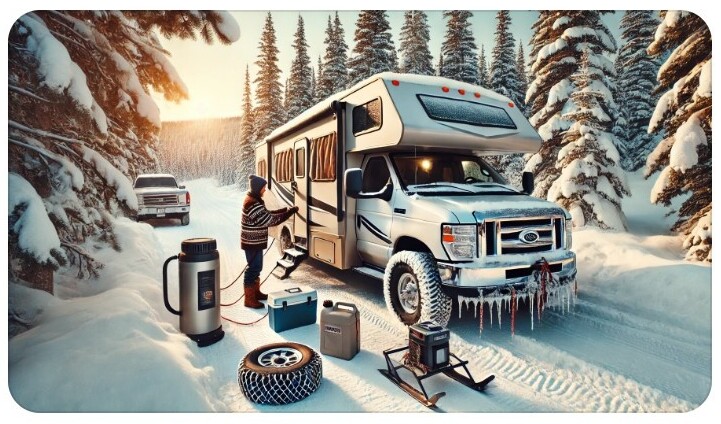
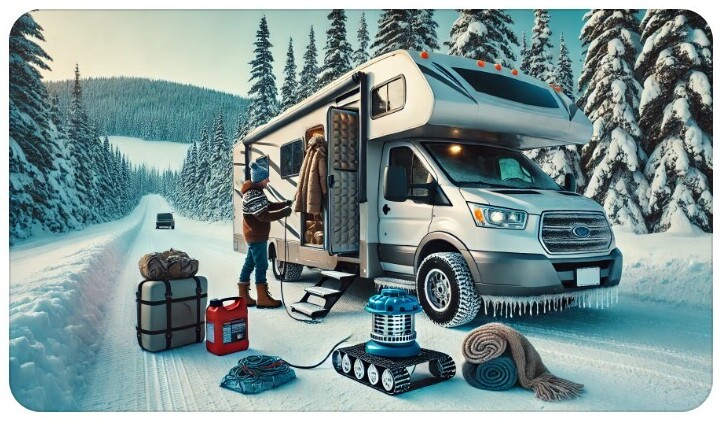
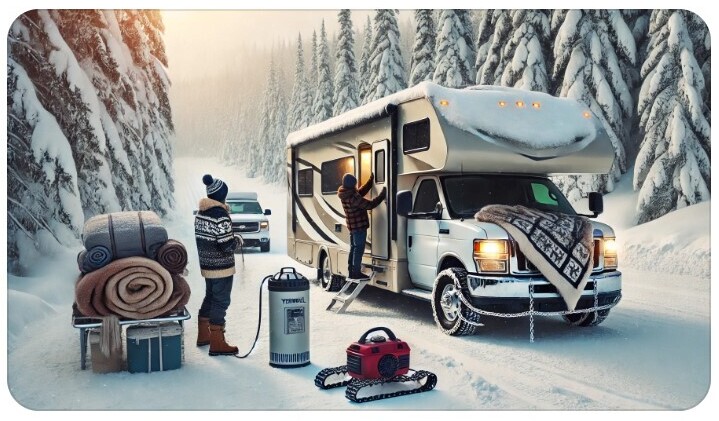
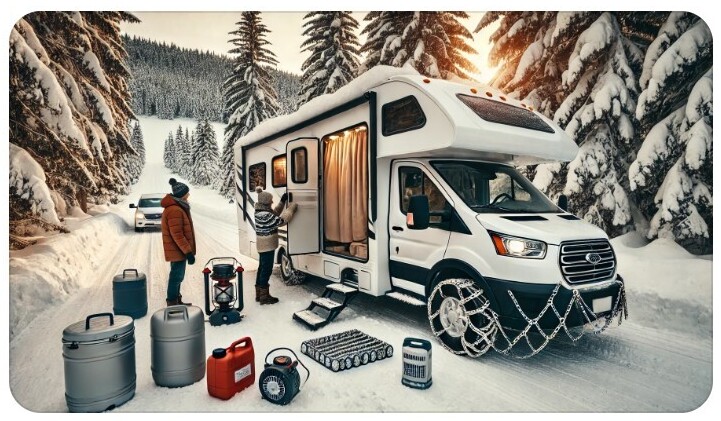


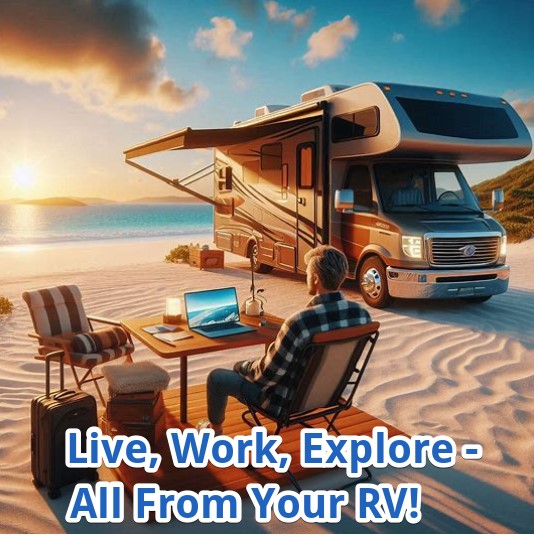
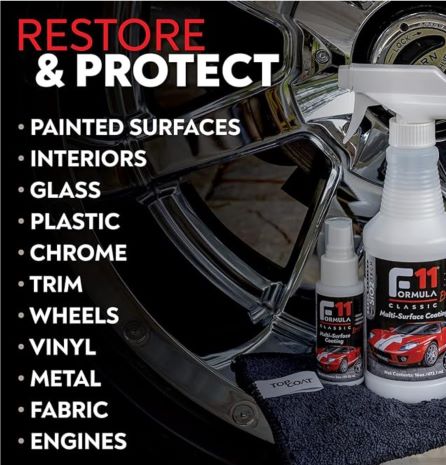




Recent Comments